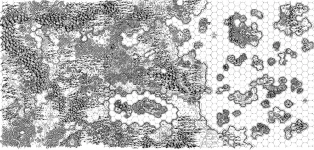EzekielRaiden
Follower of the Way
Given the way people are talking in this thread? Where they consistently talk about "objectivity" and refusing to do anything "subjective" etc. etc.? Where they are effectively claiming they have no choice but to do X/Y/Z things because otherwise they would somehow fail to be "objective"? Where they take umbrage with any form of declaring some things "important" and others not?Well, as stated, as far as I'm concerned, if anyone is actually claiming all sand boxes must be created and GMed with complete, 100% impartial objectivity at all times, they're flat out wrong. I haven't seen anyone claiming that but, if I missed it, I stand in opposition to such statements.
Within the playstyle being discussed (ie, one were the GM is aiming to act as impartial arbiter), you decide on a setting, you create ground rules for it and then you develop it according to those rules. You may choose some set of rules for development that exist independently of yourself as referee/worldbuilder but, the fact remains, you are picking your ground rules and axioms on the assumption that they will result in an entertaining game. This is self-evident; I honestly don't believe anyone in this thread is arguing otherwise.
"Realistic" in this context doesn't mean "exactly like the real world in every way". This, also, should be quite self-evident.
Yes, you do. And this is something else that is also so completely self-evident that perhaps it's worth interpreting other people's comments with the assumption that they understand this, and simply don't feel the need to state such self-evident things.
But, I'm not really interested in getting into an ongoing semantic debate about this kind of minutiae. All I'm really seeing here are a bunch of straw man arguments. "You can't be objective unless you're 100% objective." "Your world can't be or feel realistic unless it's 100% like real life." These aren't positions anyone actually holds.
I was only drawn into this discussion because of the claim that exploration isn't exploration if the goal is to explore. @Hussar seems to have clarified they don't really hold that position and, in any case, I've reach the end of my interest in that semantic argument, so I will leave you all to it.
No, I don't at all grant that these things are self-evident. Not even remotely.
There is a quite clear pattern here of somehow believing that realism is not, itself, also a style an thus subject to subjective considerations.



